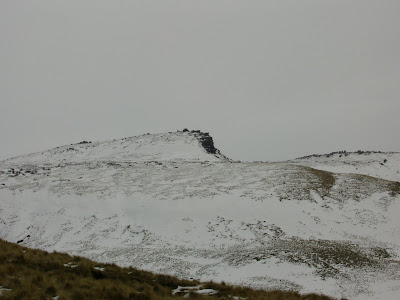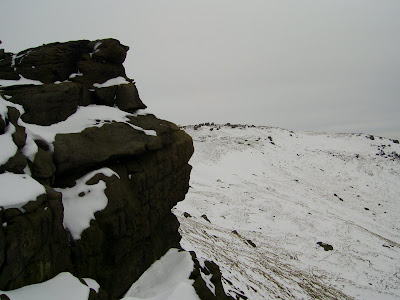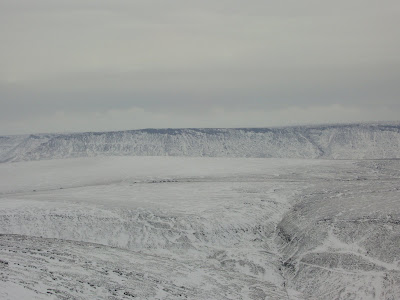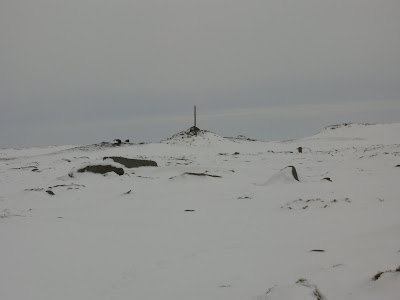
Track leading to Doctors Gate - course of Roman Road.
As I progressed further along the valley, the track turned into a narrow path which followed the course of the stream. The snow was getting thicker and deeper in places which made progress a bit awkward. Very soon the path would cross to the other side of the stream and start gaining height gradually on the other side of the valley. I had originally intended to take this route. However, not fancying the prospect of walking along an icy narrow path with a steep drop on one side, I decided to alter my route. This involved a steep direct ascent on my immediate left, up towards James's Thorn and then onto Lower Shelf Stones.

View from the ascent of James's Thorn. The Doctors Gate path traverses the right hand wall of the main valley gaining height all the time, until it reaches a shelf at the head of the valley where it joins the Pennine Way near the summit of the Snake Pass road.
As I gained height I got a great view of the valley as you can see from the photograph above. The climb was made a bit tricky by patches of deep snow which were to become thicker as I approached James's Thorn. At the top of the climb I followed the contour of the edge towards Lower Shelf Stones which was going to involve another short climb.



Photographs of approach to Lower Shelf Stones.
Just before the climb, I had a bank of snow to 'wade' through, where the snow was over knee deep. Once I reached the Lower Shelf Stones, I stopped a short while to take some photographs.


From here it was just a short round to Higher Shelf Stones where I took more photographs and sat down in the freezing cold to eat my lunch. The view from there over towards Kinder Scout North Edge was fantastic. It looked a real mountain from this point. The pictures below don't do it full justice.


View of Kinder North Edge (above left). Trig Point at Higher Shelf Stones (above right).


View of Lower Shelf Stones from Higher Shelf Stones (above left). Frozen Rocks at Higher Shelf Stones (above right).

Fairbrook Naze from Higher Shelf Stones.
Although Higher Shelf Stones has its own trig point and is higher than the surrounding area on all sides, it is not the summit of Bleaklow itself. This requires crossing an area of moorland and peak hags which goes down an incline before rising to higher ground. Even so, I could not tell where the actual summit was from where I was standing, and since there are no paths on Bleaklow I had to use my compass to take a bearing.
From here was route was going to take me to the Hern Stones and then onto the Wainstones and Bleaklow Head. I could see both sets of rocks, but not Bleaklow Head which is the real summit. So I set off to my first destination across the snow covered rough ground. Normally the peat would be dark brown or almost black, but today the moorland landscape was brilliant white all around. I stopped at the Hern Stones to take a photo. There was a photographer on the other side of the rock taking some landscape shots across the moorland. Well actually he was having a break, drinking a warm drink and looking very comfortable just enjoying being there.


Hern Stones (left). Frozen Bleaklow landscape (right).
After exchanging greetings I set off across to the Wainstones. I could see them clearly in the distance when I set off, but the land dropped down further so they were not visible as I negotiated the snow and peat hags. It wasn't until I actually reached them that they suddenly reappeared after climbing a short section of rising ground. There were two groups of people around the area, and since I wanted to take some photo's of the rocks I decide to walk onto Bleaklow Head which was a five minute walk from there, and then return to the stones later.
Bleaklow Head is a wide area of flat peat with a pile of stones and a stake. Although it does not sound much, the area is very atmospheric; the snow and grey sky seemed to enhance this impression. I had this 'summit' to myself, and stopped a short while to take in the scenery and landscape. The sky was becoming even more dull and every now and then I could feel a small flake of hard snow landing on my face. Visibility was also deteriorating in the distance.

Summit cairn at Bleaklow Head
I then retraced my steps back to the Wainstones where the last group of people were just leaving. This gave me the opportunity to take the photograph below which needed to be from a precise angle for it to look like this:

These rocks were shaped naturally by the weather of course.
Now that I had got the picture that I had been planning to take the whole day, I took another bearing, and headed off west across the pathless moorland to descend by Yellowslacks brook and Shelf Benches. This is a fascinating area of Bleaklow where the gradual moorland slope drops suddenly and sharply, and the watercourse cuts a sharp curving valley which eventually leads to the main Doctors Gate valley where I had been earlier in the day. On the eastern side of this tributary valley there are a various shelves of rocks and land. It reminds me of a miniature Grand Canyon, although that is just my personal perception. Before descending I took this photograph across the upper part of yellowslacks to Dog Rock:

And this is the view looking up yellowslacks from the track leading to Doctors Gate:

Shelf Benches, where I make my descent, can be seen on the right of the photograph.
Neither photograph does it true justice. Its one of those places that you just need to see in person.
I descended a steep rocky slope to reach a flat plateau where I found a path going towards a rocky edge ahead. The land then dropped slightly to Wigan Clough before rising to the higher land of Shelf Benches. From here I descended a slope to get back onto the Doctors Gate track which I followed back to Old Glossop where I started my walk.








